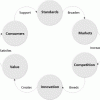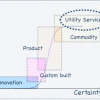Business Transformation Requires Transformational Leaders
Leadership and teaming skills are front and center in times of rapid change. Meet today’s constant disruption head on with expert guidance in leadership, business strategy, transformation, and innovation. Whether the disruption du jour is a digitally-driven upending of traditional business models, the pandemic-driven end to business as usual, or the change-driven challenge of staffing that meets your transformation plans—you’ll be prepared with cutting edge techniques and expert knowledge that enable strategic leadership.
Recently Published
Achieving Enduring and Sustainable Cost Reduction
In my last Advisor (“ Big Data Analytics in a Socially Infused Healthcare Enterprise”), I shared an account of leveraging Big Data analytics in a large healthcare IT organization.
Educating Abraham Lincoln
As we all know, Abraham Lincoln was largely self-taught in the midst of meager means and living on the frontiers in the US states of Kentucky, Indiana, and Illinois -- far from centers of learning and culture east of the Appalachian Mountains. For Lincoln, the book represented the path, and he sought them with great effort.
Back in January, when discussing trends for predictive analytics in 2012, I predicted that some of the issues holding organizations back from realizing their predictive analytics dreams would be offset by new options for implementation (see "The Year Ahead: Will 2012 Be a Breakout Year for Predictive Analyt
"Cloud" as a popular term has been around for only a few years, but the concepts of pay-as-you-go services and IT as a utility go back to the first hosted Web servers starting in the late 1990s. After 15 years or so, you would think that cloud technology would have standardized.
"Cloud computing represents a game-changing paradigm shift in the industry, with consumers (and the enterprises they serve) crying out for a broadened set of standards in areas where standards have never existed before."
-- Mitchell Ummel, Guest Editor
Many organizations have developed models to explain the introduction of a new technology in the marketplace. Few of these models, if any, identify the point at which standards become necessary and get developed, or how they influence -- positively or negatively -- the subsequent development of the products they affect.
When Do We Fill the Lifeboats?
There's a critical moment in enterprise governance that ties to when we start taking decisive executive action. I like to think of it as the "lifeboat" moment. It's when we determine that the challenges we face are too great to overcome and that we need to start salvaging what we can before the entire organizational "ship" goes under.















